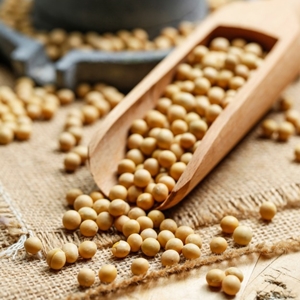Kapanlagi.com - Soybeans, the little ones full of benefits, have long been recognized as one of the best sources of plant-based protein. Not only delicious, soybeans also have a myriad of health benefits, especially in maintaining our heart health. With abundant nutrients, such as isoflavones, fiber, and healthy fats, soybeans play an important role in lowering bad cholesterol levels and improving blood vessel function.
But did you know? The way soybeans are processed greatly affects how much benefit we can derive from them. If not cooked properly, some essential nutrients can be lost or diminished. Therefore, it is important for us to know the right technique for boiling soybeans so that all its benefits are preserved.
So, how should we boil soybeans correctly to ensure its benefits for heart health remain optimal? Summarized by Kapanlagi.com from various sources on Friday (21/2/2025), here are the steps to boil soybeans that can help maintain heart health.
1. How to Boil Soybeans Properly
After the soybeans have been soaked and cleaned, here is how to boil them properly to maintain their nutrients:
1. Use Enough Water
Put the soybeans in a pot and add water in a ratio of 1:3 (1 cup of soybeans to 3 cups of water).
2. Boil on Medium Heat
Use medium heat and let it boil for 1-1.5 hours. If you want it to be quicker, you can use a pressure cooker for 20-30 minutes.
3. Do Not Add Salt While Boiling
Adding salt while boiling can make the beans' texture harder and extend the cooking time. It is better to add salt or other seasonings after the soybeans are cooked.
4. Check for Doneness
Cooked soybeans will feel softer when pressed, but still have a slightly chewy texture. If they are still hard, continue boiling until they reach the desired level of doneness.
2. How to Boil Dried Soybeans
Before processing dried soybeans into a delicious dish, the first step is to soak them. The method is quite simple: just soak the soybeans in cold water for at least 6-8 hours, or overnight for the best results. After that, discard the soaking water and rinse the soybeans with clean water.
Next, boil the soybeans in fresh water with a ratio of 2:1 (water:soybeans) for 60-90 minutes, depending on their size and type. To make it more appetizing, add a little salt while boiling.
Be sure to check the doneness of the soybeans periodically to keep them perfect, not too soft, and ready to enjoy.
3. How to Boil Fresh Soybeans (Edamame)
If you are using fresh soybeans or edamame, the boiling method is much quicker. Just boil them in boiling water for 5-7 minutes until the beans are tender.
Do not boil them for too long to keep the bright green color and crunchy texture. Edamame can be a delicious and nutritious healthy snack.
4. How to Boil Shelled Soybeans
For shelled soybeans, the boiling time will be shorter compared to whole soybeans. Make sure to check the doneness periodically so that the beans do not become too soft.
After boiling, drain the soybeans and rinse with cold water to stop the cooking process.
5. How to Consume Soybeans for Heart Health
After the soybeans are cooked, there are several ways to process them to make them more delicious and still healthy:
Consumed directly as a healthy snack without excessive seasoning.
Made into soy milk by blending with water, then straining and cooking again.
Processed into tofu or tempeh, which are rich in protein and easy to combine with various dishes.
Mixed into salads or soups to add texture and nutritional content.
6. Tips to Optimize the Benefits of Soy for the Heart
To maximize the benefits of soybeans for heart health, pay attention to the following points:
1. Combine with a Healthy Diet
Consumption of soy should be accompanied by other healthy foods such as vegetables, fruits, and lean proteins.
2. Avoid Excessive Consumption
Although healthy, excessive consumption of soy can cause digestive disturbances. Limit soy intake to about 25 grams of soy protein per day, according to FDA recommendations (U.S. Food and Drug Administration).
3. Regular Exercise and Stress Management
In addition to consuming healthy foods, maintaining heart health also requires regular exercise and good stress management.
7. Benefits of Soybeans for Heart Health
Soybeans contain many nutrients that are good for heart health, including:
- Isoflavones: These compounds act as antioxidants that help reduce inflammation and lower LDL ('bad cholesterol') levels in the blood.
- Fiber: Fiber helps lower cholesterol levels and maintain digestive health. Good digestive health contributes to overall heart health.
- Protein: Plant protein from soybeans helps maintain an ideal weight, which is important for heart health.
- Minerals: Soybeans contain minerals such as magnesium and potassium that play a role in maintaining blood pressure and healthy heart function.
Although soybeans have many health benefits, their consumption should remain balanced as part of an overall healthy diet. Consult with a doctor or nutritionist for appropriate advice regarding soy intake that suits your health condition.
8. FAQ
1. Are soybeans good for everyone?
Soybeans are generally good for many people, but those who have a soy allergy should avoid them.
2. How much soybeans should be consumed in a day?
It is recommended to consume about 1/2 to 1 cup of soybeans per day as part of a balanced diet.
3. Does boiling soybeans remove their nutrients?
No, boiling soybeans properly can actually help retain their nutrients.
4. How should cooked soybeans be stored?
Cooked soybeans can be stored in an airtight container in the refrigerator for 3-5 days.
(kpl/rmt)
Disclaimer: This translation from Bahasa Indonesia to English has been generated by Artificial Intelligence.












